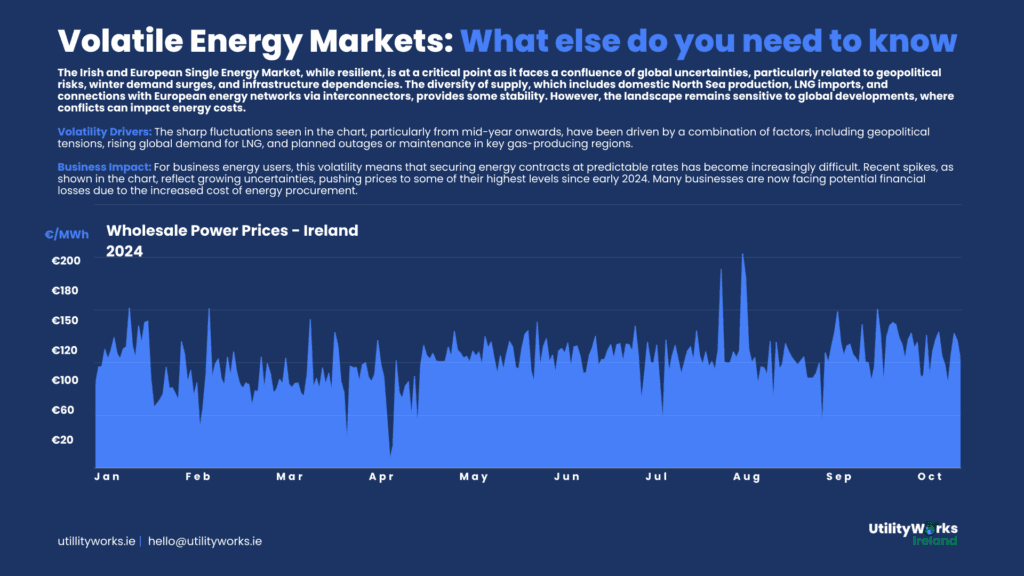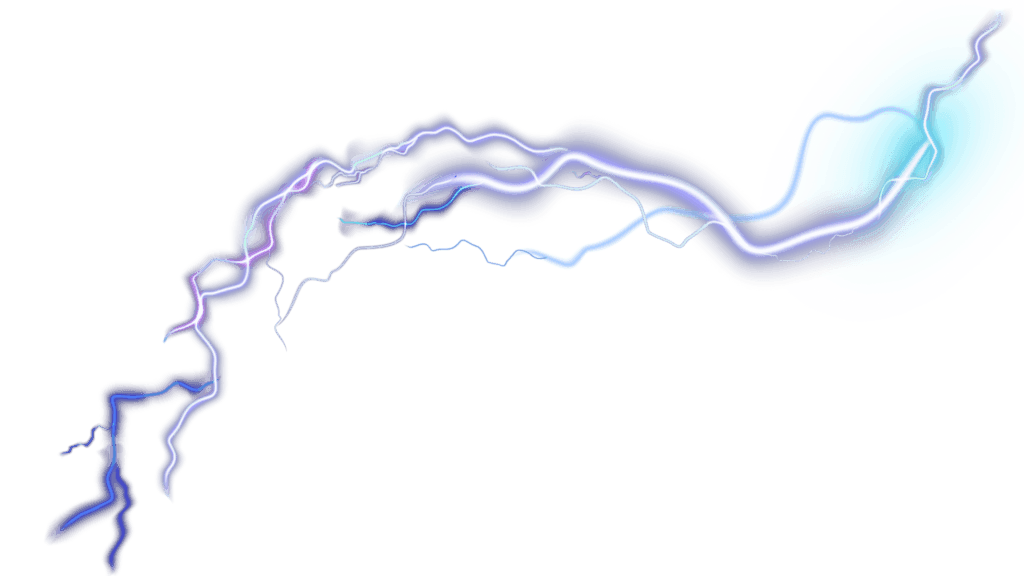As we approach the end of 2024 it is important we review business energy markets, the Irish energy market is witnessing unprecedented levels of volatility for business energy users. Global disruptions, coupled with the onset of the winter season, are driving energy prices to alarming highs, making it essential for business owners to stay informed.
In this blog, we’ll discuss what’s happening in the energy market and provide actionable strategies to help your business reduce costs in these turbulent times.
What Is Impacting The Energy Market
The energy market in Ireland and across Europe is in flux due to a combination of geopolitical tensions and seasonal demand. Here’s an overview of the key factors influencing energy prices:
1. Geopolitical Risks
Ongoing conflicts in Ukraine and the Middle East are severely impacting global energy supply chains, particularly natural gas prices. Ukraine’s announcement that it will not renew its gas transit agreement with Russia by year-end has added further uncertainty. The reduced flow of gas into Europe has a direct effect on energy prices in Ireland.
2. Winter Energy Demand Increase
As winter sets in, energy demand is naturally rising. Ireland’s dependency on gas-fired power plants to meet electricity demand is increasing, particularly as wind generation has been below average. This situation makes businesses more vulnerable to higher electricity prices, particularly during peak demand times when consumption is at its highest.
3. Gas Infrastructure Vulnerabilities
While no major maintenance is expected until 2025, unexpected disruptions—such as those witnessed in Norwegian gas pipelines—can still trigger price spikes. Any outages or supply chain interruptions could lead to additional increases in gas prices.
Business Energy Markets – Why you need to act now
The volatility of the energy market is expected to persist well into 2025. Many businesses are already feeling the financial burden of increasing energy costs. Waiting for the market to stabilise could result in even higher costs as demand grows. The following strategies can help your business mitigate these risks and reduce energy expenses.

How to Reduce Energy Costs
1. Secure Energy Contracts Early
One of the most effective ways to protect your business from future price increases is to lock in energy rates now. Securing a fixed-price contract allows for predictability, helping your business avoid the impact of any future spikes in the market. By securing energy at today’s rates, you can hedge against winter volatility and rising costs.
2. Conduct Energy Audits and Health Checks
An energy audit is an excellent tool to identify inefficiencies in your energy use. Conducting an energy health check helps assess where you can make improvements, allowing you to optimise consumption and reduce costs. At UtilityWorks Ireland, we provide comprehensive energy audits designed to highlight areas of inefficiency, helping you lower both consumption and overall expenses.
3. Invest in Renewable Energy Solutions
Investing in renewable energy is a long-term strategy that can yield significant savings. Solar photovoltaic (PV) systems, for example, allow businesses to generate their own power, thus reducing reliance on the volatile energy market. UtilityWorks Ireland offers end-to-end renewable energy solutions, providing businesses with the expertise needed to seamlessly integrate renewable power and achieve long-term savings.
4. Leverage Demand Flexibility and Optimisation
Businesses that manage their energy use during peak periods can lower costs and even earn revenue through demand reduction services offered by the National Grid. By optimising your energy use, you not only reduce your electricity costs but also contribute to Ireland’s sustainability goals by lowering your carbon footprint.
Preparing For Future Business Energy Market Challenges
While the Irish energy market is experiencing volatility, your business doesn’t have to suffer. A strategic approach to energy management can protect your business from unpredictable price fluctuations while promoting sustainability.
At UtilityWorks Ireland, we offer a range of solutions that go beyond energy procurement. From renewable energy integration to energy audits and demand flexibility solutions, we ensure that your business is positioned for long-term success. With our focus on transparent, low-carbon, and innovative energy products, we help you navigate market challenges while aligning with your sustainability goals.
-
Why is the Irish energy market so volatile right now?
The Irish energy market is experiencing volatility due to several factors, including geopolitical tensions, seasonal demand increases, and infrastructure vulnerabilities. Conflicts in Ukraine and the Middle East are disrupting energy supply chains, while the EUs reliance on gas-fired power makes it particularly susceptible to price fluctuations.
-
How do fixed-price contracts benefit businesses?
Fixed-price contracts allow businesses to lock in energy rates for a specific period, offering predictability in a volatile market. This helps businesses manage their energy costs more effectively and avoid sudden price increases due to market fluctuations.
-
How do global energy markets impact business energy costs in Ireland?
Global energy markets influence business energy costs in Ireland due to the country’s reliance on imported gas and electricity. When there are disruptions in global supply chains—such as geopolitical conflicts or reduced gas flow—prices in Ireland rise as supply becomes constrained. Additionally, global energy trends, such as increasing demand during winter months, also contribute to higher costs for Irish businesses.
-
Are there any government schemes or incentives available to help businesses reduce energy costs?
Yes, the Irish government offers several schemes and incentives to help businesses reduce energy costs. Programs like the Sustainable Energy Authority of Ireland (SEAI) grants provide funding for energy efficiency projects and renewable energy installations. These initiatives help businesses reduce their reliance on the volatile energy market while improving overall sustainability and lowering costs in the long run.
-
What is an energy audit, and how can it help my business?
An energy audit is a comprehensive review of your business’s energy usage and costs. It helps identify inefficiencies and opportunities to reduce energy consumption. By addressing these inefficiencies, businesses can lower their energy costs and improve their sustainability efforts.

